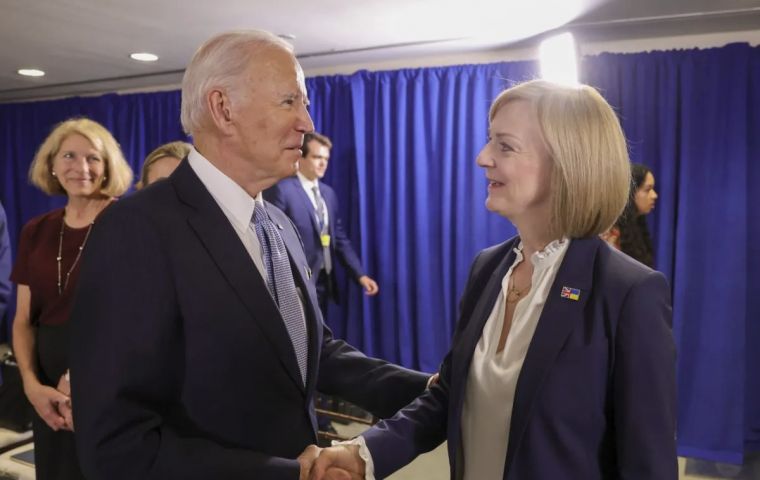MercoPress. South Atlantic News Agency
Truss meets Biden in New York; talks focus on the Good Friday Agreement and peace in Northern Ireland
 Biden described the UK as “our closest allies in the world,” with Britain the second-largest donor to Ukraine after the US.
Biden described the UK as “our closest allies in the world,” with Britain the second-largest donor to Ukraine after the US. United Kingdom prime minister Liz Truss and US president Joe Biden held bilateral talks on the sidelines of the United Nations annual Assembly with special emphasis on the Good Friday Agreement that helped to end decades of conflict in Northern Ireland.
The US under the president Bill Clinton administration, one of the main sponsors of the agreement, in the past has voiced concern that British and European actions in the aftermath of Brexit could jeopardize the peace process in Northern Ireland
Biden expressed condolences for the death of the queen and congratulated Truss on becoming prime minister. He called the UK “our closest allies in the world,” with Britain the second-largest donor to Ukraine after the US.
He began by listing a series of areas where US and British foreign policy broadly align, Ukraine and Russia, a more assertive China, preventing Iran from acquiring a nuclear weapon, and energy — but he concluded with an invitation for Truss to outline her plans on Northern Ireland.
“And finally, we both are committed to protecting the Good Friday Agreement in Northern Ireland. I'm looking forward to hearing what's on your mind and how we can continue to cooperate,” Biden said.
Truss, too, started with areas of agreement and left Northern Ireland until last in her opening statements.
“And of course, I'm looking forward to discussing the Belfast Good Friday Agreement, and how we make sure that's upheld in the future,” Truss said.
After the talks, Downing Street said that Truss and Biden had agreed that the “priority must be protecting the Good Friday Agreement” and preserving the peace gained in Northern Ireland.
Whether the two governments will ultimately agree on how that is best achieved could prove more complicated.
Under the terms of a Brexit deal with the EU negotiated by Truss' predecessor, Boris Johnson, Northern Ireland has maintained an open land border with the Republic of Ireland, which is a fully fledged EU member.
An open border on the island of Ireland, plus the ability for citizens either side of it to choose whichever nationality they pleased, was among the core terms of the peace deal signed in 1998.
Northern Ireland remains to all intents and purposes a part of the EU's customs union and single market, while the rest of the UK does not. As a result of that, though, Johnson's government had agreed to customs checks on some goods moving from mainland Britain to Northern Ireland, designed to prevent goods reaching the EU single market via Northern Ireland.
This has proved unpopular with pro-UK unionist communities in Northern Ireland, which argue that it has undermined the country's status as an equal part of the UK.
Johnson had threatened several times to unilaterally break parts of the deal with the EU on Northern Ireland, and put forward draft legislation that would breach parts of the deal prior to his departure. The EU launched legal action in response; the new law is not yet in effect.
Truss had said during her leadership bid that she hoped to renegotiate terms with the EU, but threatened to unilaterally act if she cannot.
The Irish question has long been sensitive in the US, with a large population with Irish heritage, including Catholic Joe Biden's family, on his paternal and particularly maternal sides. While the EU argues that unilateral change would threaten the Good Friday accord by forcing the creation of some kind of border in Ireland, the UK has in the past argued that the current terms are also putting the peace deal at risk by angering unionists.
The global gathering in New York has provided an excellent opportunity for the new prime minister to touch base with a series of allies, following a first two weeks in office that were dominated by the death and state funeral of Queen Elizabeth II.




Top Comments
Disclaimer & comment rulesCommenting for this story is now closed.
If you have a Facebook account, become a fan and comment on our Facebook Page!